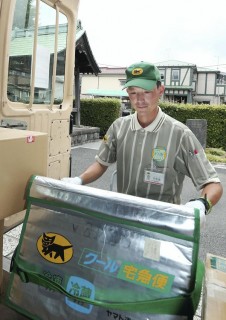Loading
Search
▼ Parcel Delivery, Food Price Hikes to Hit Home in October
- Category:Souvenir
TOKYO (Jiji Press) — Many companies, including parcel delivery firms and food product makers, raised prices on Sunday chiefly to cover spiraling material procurement and labor costs.
Although some of the markups will be made in the wholesale stage, households in the country, which have increasingly been tightening their purse strings, would see further damage to their pocketbooks as retail price increases are likely to follow.
On the first day of October, the beginning of the fiscal second half, major parcel delivery company Yamato Transport Co. raised its basic shipping rates for individual customers by 15 percent on average, in response to driver shortages amid a surge in delivery demand for online shopping products.
The Yamato Holdings Co. unit implemented a basic rate hike for the first time in 27 years, except when the consumption tax rate was raised from 5 percent to 8 percent in April 2014.
Yamato Transport is now negotiating with corporate customers, including Amazon Japan G.K. and other shopping website operators, on rate hikes.
Among food makers, Ninben Co. lifted wholesale prices of dried bonito products by about 10 to 25 percent. Momoya Co. and Nisshin Oillio Group Ltd. also raised wholesale prices of 17 boiled laver products and some cooking oil products, respectively.
Those hikes are likely to be followed by retail price markups, industry sources said.
At the retail level, Torikizoku Co., which operates pubs offering yakitori chicken skewers and drinks, increased the uniform per-menu-item price from ¥280 to ¥298 before tax, the first hike in 28 years.
Philip Morris Japan Ltd. carried out markups on 32 cigarette brands by ¥10 per pack, in an apparent bid to improve those products’ profitability at a time when the smoking population is declining and electric cigarettes are attracting more smokers. One pack contains 20 cigarettes.
Meanwhile, long-term inpatients aged 65 or over will face rises in utility fees charged by hospitals, which are aimed at curbing the national medical insurance cost.
Among such elderly inpatients, totaling some 210,000 people nationwide, those with relatively minor symptoms will have to pay ¥370 per day, up from ¥320. Sufferers of more severe symptoms will be newly required to pay the bill, initially charged ¥200 and ¥370, six months later.
Although some of the markups will be made in the wholesale stage, households in the country, which have increasingly been tightening their purse strings, would see further damage to their pocketbooks as retail price increases are likely to follow.
On the first day of October, the beginning of the fiscal second half, major parcel delivery company Yamato Transport Co. raised its basic shipping rates for individual customers by 15 percent on average, in response to driver shortages amid a surge in delivery demand for online shopping products.
The Yamato Holdings Co. unit implemented a basic rate hike for the first time in 27 years, except when the consumption tax rate was raised from 5 percent to 8 percent in April 2014.
Yamato Transport is now negotiating with corporate customers, including Amazon Japan G.K. and other shopping website operators, on rate hikes.
Among food makers, Ninben Co. lifted wholesale prices of dried bonito products by about 10 to 25 percent. Momoya Co. and Nisshin Oillio Group Ltd. also raised wholesale prices of 17 boiled laver products and some cooking oil products, respectively.
Those hikes are likely to be followed by retail price markups, industry sources said.
At the retail level, Torikizoku Co., which operates pubs offering yakitori chicken skewers and drinks, increased the uniform per-menu-item price from ¥280 to ¥298 before tax, the first hike in 28 years.
Philip Morris Japan Ltd. carried out markups on 32 cigarette brands by ¥10 per pack, in an apparent bid to improve those products’ profitability at a time when the smoking population is declining and electric cigarettes are attracting more smokers. One pack contains 20 cigarettes.
Meanwhile, long-term inpatients aged 65 or over will face rises in utility fees charged by hospitals, which are aimed at curbing the national medical insurance cost.
Among such elderly inpatients, totaling some 210,000 people nationwide, those with relatively minor symptoms will have to pay ¥370 per day, up from ¥320. Sufferers of more severe symptoms will be newly required to pay the bill, initially charged ¥200 and ¥370, six months later.
- October 4, 2017
- Comment (1)
- Trackback(0)



Zohaib Siddiqui Web Site- May 20, 2018